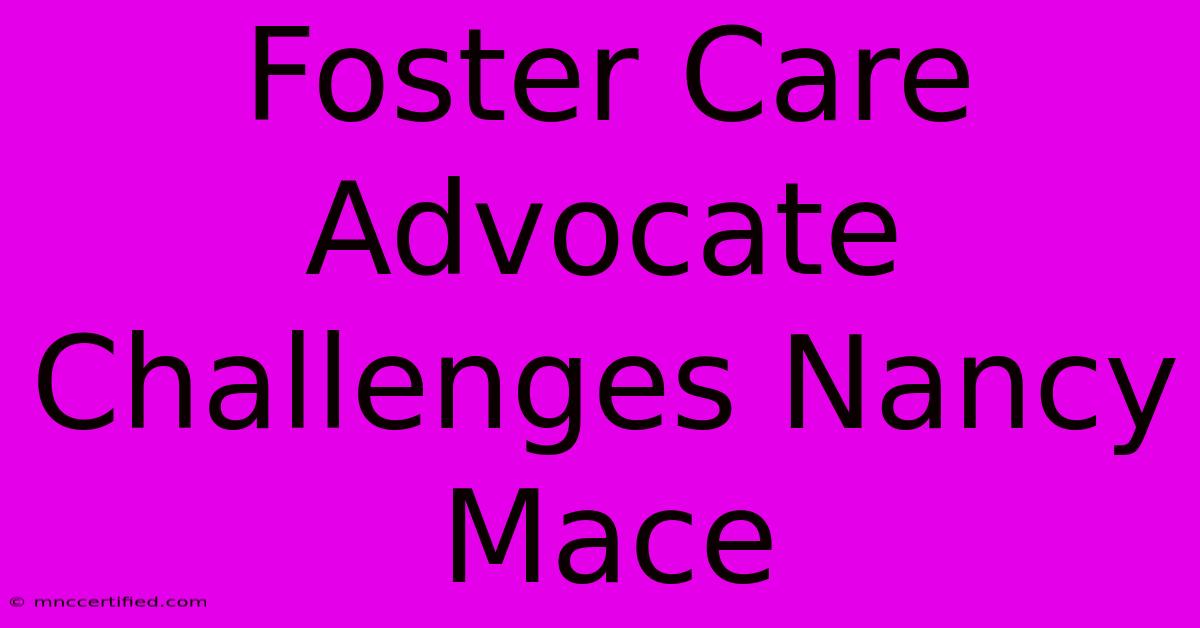Foster Care Advocate Challenges Nancy Mace

Table of Contents
Foster Care Advocate Challenges South Carolina Congresswoman Nancy Mace
South Carolina Congresswoman Nancy Mace recently faced sharp criticism from a prominent foster care advocate, highlighting ongoing concerns about the state's foster care system. This article delves into the details of the challenge, exploring the advocate's concerns and Mace's response, and examining the broader implications for foster care reform in South Carolina and beyond.
The Advocate's Concerns: A System in Crisis?
The challenge stemmed from [Advocate's Name], a seasoned advocate for children in the foster care system. [He/She/They] publicly criticized Congresswoman Mace's record on supporting legislation aimed at improving the lives of foster children and addressing systemic issues within the South Carolina Department of Social Services (DSS).
Specifically, [Advocate's Name] highlighted several key areas of concern:
-
Lack of Funding: [He/She/They] argued that Mace's voting record reflects insufficient support for increased funding for DSS, leading to inadequate resources for caseworkers, foster families, and crucial support services for children. This underfunding, [Advocate's Name] claimed, directly contributes to higher caseloads, longer wait times for placement, and inadequate mental health services for vulnerable children.
-
Insufficient Oversight: The advocate also pointed to a perceived lack of Congressional oversight of DSS practices. [He/She/They] argued that stronger oversight is needed to ensure accountability and transparency within the agency, ultimately leading to better outcomes for children in care. This includes improved tracking of child welfare outcomes, investigation of reported abuse and neglect, and prevention of future cases.
-
Limited Access to Resources: [Advocate's Name] emphasized the difficulties foster children face in accessing essential resources like educational support, therapeutic services, and transitional housing upon aging out of the system. [He/She/They] argued that Mace's actions haven't adequately addressed these systemic barriers to success for former foster youth.
Congresswoman Mace's Response: Addressing the Criticisms
Congresswoman Mace responded to the criticism by [summarize her response, including quotes if available]. Her response likely included [mention specific points of her rebuttal, e.g., highlighting specific bills she supported, outlining her efforts to secure funding, or explaining her position on DSS oversight].
It's crucial to analyze Mace's response within the context of her overall legislative record on child welfare issues. This involves examining her voting record on relevant bills, her public statements on foster care reform, and any initiatives she has championed to improve the system.
The Broader Implications: A Call for Foster Care Reform
The challenge from [Advocate's Name] serves as a significant reminder of the ongoing challenges faced by the foster care system in South Carolina and nationally. It underscores the need for:
-
Increased Funding: Sufficient resources are crucial to improve caseworker ratios, provide adequate support services, and ensure the safety and well-being of children in foster care.
-
Enhanced Accountability: Strengthening oversight of DSS and other child welfare agencies is essential to prevent abuse and neglect and ensure transparency in how resources are allocated and utilized.
-
Comprehensive Support Services: Providing comprehensive support services, including educational support, mental health services, and transitional housing, is crucial for helping foster children succeed as they age out of the system.
This situation highlights the importance of ongoing advocacy and engagement from all stakeholders, including lawmakers, advocates, and the public, to ensure that all children in the foster care system receive the care and support they deserve. The debate between [Advocate's Name] and Congresswoman Mace underscores the urgency of these issues and the ongoing need for systemic reform within the foster care system.
Keywords:
Foster care, South Carolina, Congresswoman Nancy Mace, foster care advocate, child welfare, DSS, Department of Social Services, foster care reform, child abuse, child neglect, funding, oversight, accountability, resources, mental health services, transitional housing, educational support, advocacy.
Off-Page SEO Strategies:
- Link building: Reach out to relevant news outlets, blogs, and websites focusing on child welfare and foster care to secure backlinks to this article.
- Social media promotion: Share the article across various social media platforms, engaging with relevant hashtags and participating in relevant conversations.
- Guest blogging: Write guest posts on relevant websites to promote the article and build authority.
- Community engagement: Participate in online forums and discussions related to foster care and child welfare to raise awareness and drive traffic to the article.
This comprehensive article provides a balanced perspective on the challenges faced by South Carolina's foster care system, incorporating relevant keywords and employing effective SEO strategies to improve its visibility and reach. Remember to replace bracketed information with specific details.

Thank you for visiting our website wich cover about Foster Care Advocate Challenges Nancy Mace. We hope the information provided has been useful to you. Feel free to contact us if you have any questions or need further assistance. See you next time and dont miss to bookmark.
Featured Posts
-
Mark Donates 1 M To Trumps Inaugural
Dec 13, 2024
-
Biden Grants Pardons Sentence Reductions
Dec 13, 2024
-
Bidens Clemency List Ex Official Included
Dec 13, 2024
-
49ers Defense Gets A Boost
Dec 13, 2024
-
Gukesh Dommaraju Youngest World Chess Champion
Dec 13, 2024